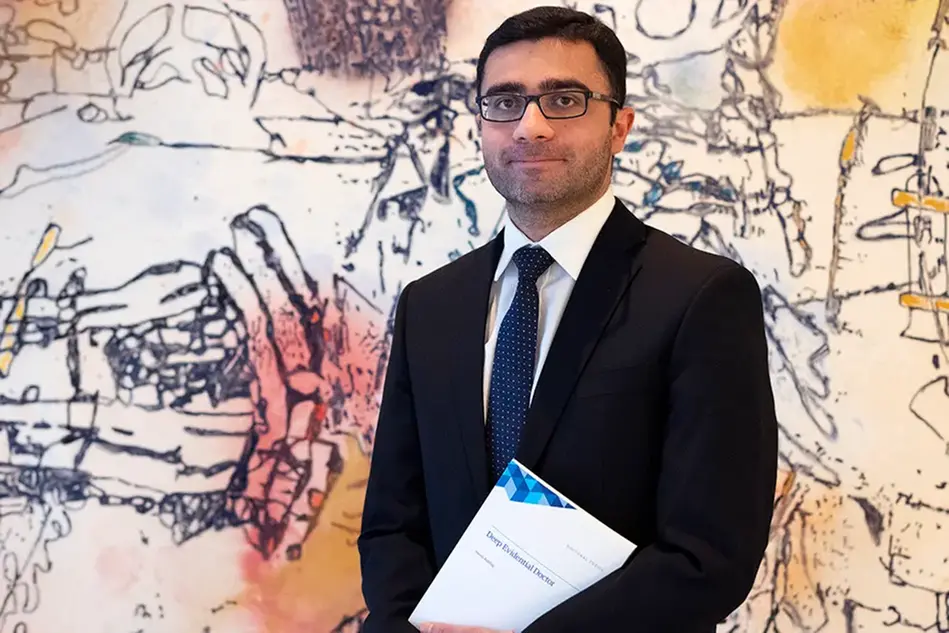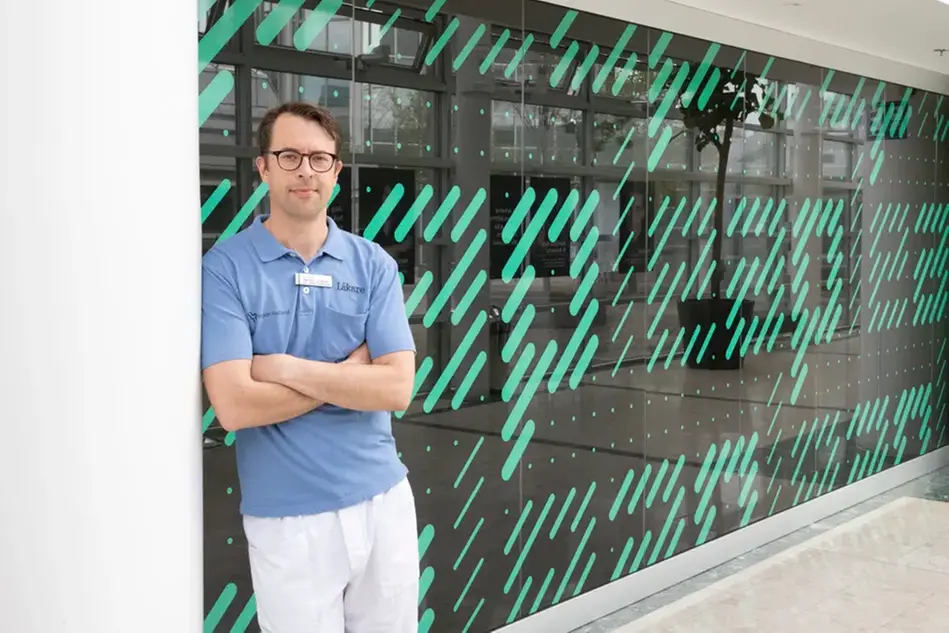Better care at a lower cost by using data
We are faced with numerous healthcare challenges in the coming years that will require an improved quality of care without increasing costs. Part of the solution is to take advantage, in new ways, of all the health-related data that is collected every day. This data can, with the help of AI, give us more detailed information about certain patient groups to predict the care and resources needed. An extensive research collaboration between Region Halland and Halmstad University has resulted in unique prediction models, based on AI. The research is presented in a recently published PhD thesis within the area of information-driven care.

“The thesis demonstrates a progress in unlocking the potential of AI in healthcare to empower clinicians and patients with informed decision-making tools.”
Awais Ashfaq, Postdoctoral fellow at Halmstad University
Halland is taking the lead
With a growing elderly population, many chronic conditions are rapidly increasing in our society. These conditions, for example cancer, dementia, diabetes, and heart diseases, as well as the rising numbers of mental health disorders, are very challenging and resource-intensive for our healthcare system. Healthcare organisations must find ways to improve the quality of care and, at the same time, reduce costs.
“There are several initiatives in Sweden with the goal to develop healthcare by using artificial intelligence. What is notable in Halland is that we are working with real world data in sharp research projects where we collaborate across organisations and disciplines”, says Markus Lingman, Medical Doctor and Strategist on the Halland Hospital board and Adjunct Professor of Medicine at Halmstad University.
“The collaboration between Region Halland and Halmstad University has broken new ground – we are already contributing to the necessary shift of our healthcare system to become more information-driven. It is time to move up the cognitive pyramid! Let the computers do what they are best at, and humans what we are best at”, says Markus Lingman.
Information from current patients can prevent future diseases
Information-driven care is a concept where artificial intelligence (AI), specifically machine learning, is applied to data that has been collected within healthcare organisations. The data can be both clinical data and resource related data. Machine learning algorithms can find patterns and draw conclusions from large amounts of data and predict certain outcomes. This information can be used by clinicians to give their patients the best possible care and to enable early disease detection and prevention. The management of healthcare organisations can also use these prediction models to save resources without compromising the quality of care for the patients.
"Let the computers do what they are best at, and humans what we are best at."
Markus Lingman, Medical Doctor and Strategist on the Halland Hospital board
Halmstad University and Region Halland have collaborated in research around data science and healthcare for the past decade. All research projects that handle health data are carried out within the approved legal framework. Part of the research results are presented in the five scientific articles forming a recently published PhD thesis titled “Deep Evidential Doctor” by Awais Ashfaq.
“The machine learning models that we develop can be used to predict future patient outcomes. Most often, we are interested in predicting adverse outcomes so that necessary actions can be taken to avoid or prepare for them. An adverse outcome can, for example, be disease onset, hospital readmission and death”, says Awais Ashfaq, Postdoctoral fellow at the School of Information Technology at Halmstad Univertsity.

Awais Ashfaq presented his PhD thesis "Deep Evidental Doctor" on March 15, 2022.
"Awais has made strong contributions toward how machine learning algorithms can represent the data and the knowledge, quantify uncertainty, and deal with surprising situations. At the same time, the work is very well anchored with clinicians within Region Halland, and motivated by real challenges”
Slawomir Nowaczyk, Professor in Machine Learning
Preventing readmission for heart failure patients
One of the articles in Awais Ashfaq’s thesis shows the result of a hospital readmission prediction study for patients with heart failure. One out of four patients in this patient group is readmitted within 30 days of discharge. Being readmitted poses a significant health risk for the patient due to hospital-acquired infections and clinical errors. Readmissions also lead to escalating care costs for the healthcare system. To reduce readmissions, targeted intervention programmes must be initiated for high-risk patients. Awais Ashfaq and the other researchers used data from 7500 heart failure patients in Halland to identify high-risk patients by machine learning prediction models.
“The results of this study will contribute to the gradual and safe adoption of artificial intelligence in the clinical setting”, says Markus Lingman, who was one of Awais Ashfaq’s supervisors during his PhD research.
Slawomir Nowaczyk is a Professor in Machine Learning at Halmstad University and Awais Ashfaq’s principal supervisor:
“From a data science and machine learning point of view, this study is specifically interesting since it combines, in very unique ways, deep theoretical and algorithmic developments in the field of artificial intelligence with practical and impactful considerations from direct interactions with the healthcare system. Awais has made strong contributions toward how machine learning algorithms can represent the data and the knowledge, quantify uncertainty, and deal with surprising situations. At the same time, the work is very well anchored with clinicians within Region Halland, and motivated by real challenges”, says Slawomir Nowaczyk.

Markus Lingman is a Medical Doctor and Strategist on the Halland Hospital board and Adjunct Professor of Medicine at Halmstad University.
Deep neural network models
Awais Ashfaq’s research has focused on developing AI models, more specific deep neural network models. The models use existing patient data in Electronic Health Records (EHRs) from Region Halland to predict adverse patient outcomes.
“Overall, this thesis demonstrates progress in unlocking the potential of AI in healthcare to empower clinicians and patients with informed decision-making tools. However, we believe that there are other emerging ethical and technical challenges to be addressed, to reap the full benefits of data and AI in healthcare”, says Awais Ashfaq.
Next step is explainability
Awais Ashfaq has collaborated with several multi-disciplined researchers during his PhD, mainly from Halmstad University, Region Halland, Lund University, Harvard Medical School, Brigham Women’s Hospital, and the companies Novartis and AstraZeneca. One concrete research result is the development of a generic prediction model called Deep Evidential Doctor (DEED). The model learns efficient representations of clinical concepts and patient trajectories from EHRs for personalised predictions, along with robust and reliable confidence estimates.
“While the prediction scores facilitate identification of patient risk groups, the confidence estimates support user-trust in these prediction models by allowing us to understand when they say, ‘I don’t know’. Thus, if need be, design redundancy into their applications to avoid dubious predictions”, says Awais Ashfaq.
“For future works, we aim to extend the DEED framework to incorporate wider data modalities such as clinical notes, signals and daily lifestyle information. We will also work to equip DEED with explainability features to enhance the acceptance in real clinical practice”, says Awais Ashfaq.
Text: Louise Wandel
Photo: Anna-Frida Agardson and Dan Bergmark
Top illustation: iStock
About Awais Ashfaq
- Born in Pakistan, on November 9, 1990.
- Education: Bachelor of Science in Electrical Engineering from EME NUST Pakistan in 2013. Master of Science in Medical Engineering from KTH Sweden in 2016
- Joined Halmstad University as a PhD student in October 2016.
- The PhD defence took place on March 15, 2022.
How come you chose Halmstad University for your doctoral education?
“I have always been interested in working at the intersection of medicine and computer science. I was fortunate to have seen this PhD opportunity at Center for Applied Intelligent Systems Research (CAISR) at Halmstad University in mid-2016, which was a good match to my interest. Learning about the close research collaborations with Region Halland and Harvard Medical School, and the work around the development of the Region’s information platform, further sparked my interest in pursuing doctoral education at Halmstad University.”
When and how did your interest in information technology start?
“I was intrigued to learn about the potential of machine learning and artificial intelligence algorithms to solve complex real-life problems – particularly in healthcare. I learned the basics during my master’s studies, and the interest evolved over time as I progressed on my machine learning journey.”
In your PhD research, are any results especially surprising to you?
“Unveiling the potential of a comprehensive clinical information platform within the approved legal framework, coupled with an advanced data-science toolbox, has been fascinating in numerous ways. To mention a few, our hospital readmission prediction study has motivated real-time assimilation of relevant clinical data for a prospective evaluation in Halland hospital. Our emergency care mortality prediction model built in Halland is being validated as a test case in Stockholm to investigate the challenges involved in prediction model transferability across different sites. Our work on heart failure patients has motivated a stricter implementation of pharmacotherapy guidelines because, on average, a non-compliant patient was found to cost 1051 Euro per year more to the healthcare system, in addition to other medical risks. We identified and described the high-need, high-cost patient groups in Halland, motivating new intervention designs to better manage their care needs and curb healthcare costs.”
What are your plans for the future?
“I aim to continue being part of the research group in Halland, addressing the intelligibility and ethical aspects of data-driven prediction models in healthcare. Simultaneously, I will focus on delivering real clinical impact of our research by working on routines for implementation of deep learning-based decision support models in clinical practice.”
About the PhD thesis
Thesis title: Deep Evidential Doctor
Link to thesis: https://www.diva-portal.org/smash/record.jsf?pid=diva2%3A1637806&dswid=-5416 External link.
External link.
Supervisors:
- Slawomir Nowaczyk, Halmstad University
- Markus Lingman, Region Halland
- Mark Dougherty, Halmstad University
- Anita Sant’Anna, Halmstad University
- Jens Lundström, Halmstad University
The PhD defence took place on March 15, 2022.
Chairman of the defence: Docent Farzaneh Etminani, Halmstad University
Opponent: Associate Professor Cristina Soguero Ruiz, Universidad Rey Juan Carlos
Examination board:
- Professor Myra Spiliopoulou, Otto-von-Guericke-University
- Professor Ricard Gavalda, Universitat Politècnica de Catalunya
- Professor Martin Atzmüller, Osnabrück University
Information driven care at Halmstad University
Halmstad University aims, together with Region Halland, to develop a leading European competence node for information driven care. Initiatives within information driven care at Halmstad University:
- Center for Applied Intelligent Systems Research, CAISR, is a research and education center for AI. CAISR has two main application areas: information driven care and intelligent vehicles & predictive maintenance. hh.se/caisr
 External link.
External link.
- CAISR Health is a research profile within information driven care where research on the development of AI tools meets research on how these tools can be implemented in healthcare. hh.se/caisrhealth
 External link.
External link.
- Health Data Centre, HDC, is centre for research and analytics within health data and AI, established by Halmstad University, Region Halland and Hallandia V.
- Leap for Life is Halland’s innovation centre within connected health. It is co-owned by Region Halland, Halmstad University and all municipalities in Halland. leapforlife.se
 External link.
External link.
- Health Innovation is an interdisciplinary education and research focus area. It is one of two focus areas at Halmstad University. hh.se/healthinnovation
 External link.
External link.

